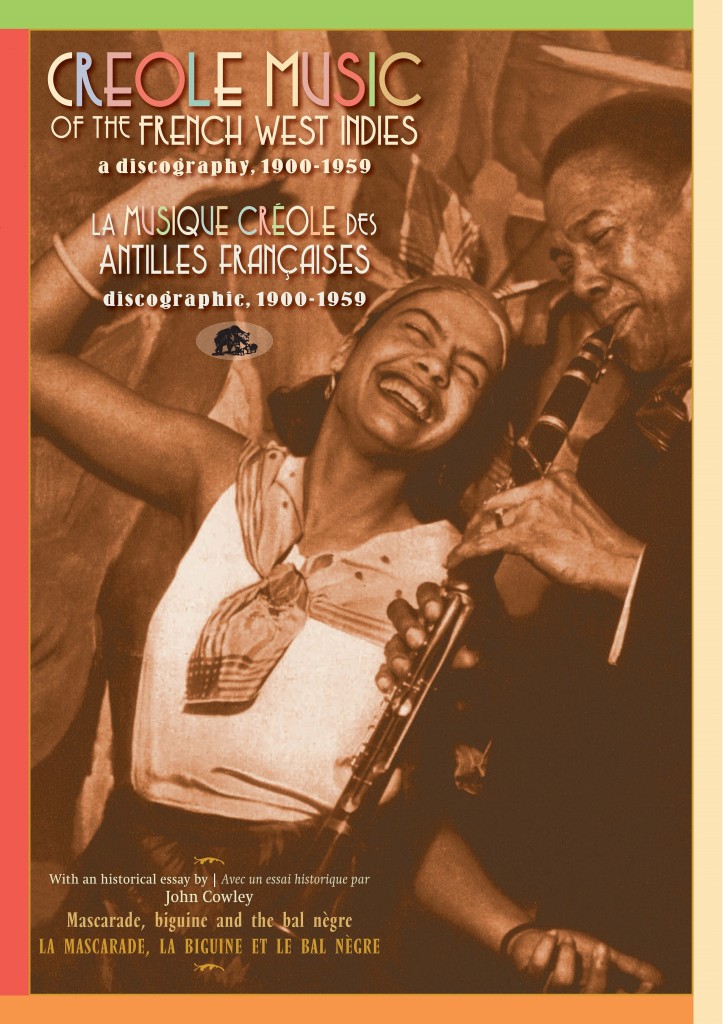Join us at the launch of Creole Music of the French West Indies, A Discography on 23 January 2015 at 6.00pm
The biguine is a genre of rhythm-based music and song that probably originated in Martinique, and epitomises black Creole music from the French Antilles. The evolution of this style is explored in Creole Music of the French West Indies, A Discography, 1900-1959, edited and with an essay ‘Mascarade, biguine and the bal negrè’ by John Cowley.
Biguine is strongly associated with Carnival and dancing: activities that enjoyed wide popularity in Saint-Pierre, Martinique, prior to the town’s lightning destruction in 1902 as a result of the eruption of Mont Pelée, its overshadowing volcano. The settlement was sometimes known as the ‘Paris of the Caribbean’ and recognised as Martinique’s cultural capital. Despite the destruction that resulted from la catastrophe, music (and festival) survived in French jurisdictions in the area.
Black Creole performance traditions and other cultural characteristics developed in the islands of the Antilles from the period of enslavement. Often these cultural practices were tied to language affinities, drawing on African and European sources in varied combination. They were further enriched by interchange between territories with differing administrative principles. A key measure of this creativity is festive occasions, with Christmas-New Year celebrations and Shrovetide Carnival being special instances of the dynamism of social diversity that leads to constructive originality. For the Commonwealth Caribbean the Trinidad Carnival is the prime example of this phenomenon.
The history of Trinidad reflects this multiplicity of Caribbean interchange and invention. Conquered and proselytized by Spain, the island was sparsely populated until the late eighteenth century, when Catholic plantation owners from French islands (principally Martinique) were encouraged to expand the country’s sugar production by settling there with their enslaved black and Catholic workforce. Though taken by the British in 1797, when English became the language of administration, these circumstances meant that the core of the island’s black population spoke French Creole well into the twentieth century. One consequence of this circumstance is that through the language of French Creole other islands in the Commonwealth Caribbean once controlled by France maintained under-appreciated links with those territories that are now départements d’outre-mer.
Building on investigation into the evolution of Carnival in 19th Century Trinidad, which resulted in his book Carnival, Canboulay and Calypso (Cambridge, C.U.P., 1996), John Cowley’s associated pioneering treatment, it is evident that cultural interchanges between British and French-administered Caribbean possessions were commonplace in the nineteenth century and, for Carnival, can be identified by parallel masquerade traditions and exchanges in musical repertoire.
Elements of this music and folklore from the Antillean vernacular, together with later developments, are listed in the discography Creole Music of the French West Indies, a work which breaks new ground in the understanding of black music from the Caribbean.
The inventory, arranged alphabetically by performer, commences chronologically with a linguistic sample recorded on cylinder at the Paris Exposition Universelle de 1900. Folktales that were obtained in French islands using the same technique by the anthropologist Elsie Clews Parsons during the 1920s are also itemised — many had musical accompaniment, though the cylinders are lost. Of the repertoire recorded commercially by Antillean musicians in Paris between 1929 and 1931 almost one third of their performances can be traced to political, satirical and marching chants from annual Carnivals of the doomed city of Saint-Pierre — songs from the same corpus were recorded occasionally into the 1950s, expressing the longevity of traditional Carnival choruses and their distribution throughout the French Creole-speaking Antilles.
A similar combination of ancient creole songs as well as topical and satirical elements can be found in commercial recording of vernacular music from Trinidad (some of which interchange with biguine performances) beginning in 1914 and from the 1920s concurrently in New York City and Trinidad until the Second World War. This trend was maintained subsequently in Britain as well as the prior locations. Comparatively, as the discography demonstrates, Paris remained the centre for the recording of French Antillean music despite the hiatus occasion by the Second World War (1939-1945). Following the cessation of hostilities and the beginning of economic recovery, during the 1950s studios in the outre-mer islands began to produce records aimed primarily at local markets reflecting economic and cultural changes in the new era.
The wide-ranging contextual content of Creole Music of the French West Indies — the discographical material being gathered in collaboration with two French experts, Alain Boulanger and Marc Monneraye — allows this multidisciplinary work to become an essential handbook in the growing resources for comprehending the evolution of black music in the Americas.
Join us at the launch of Creole Music of the French West Indies, A Discography on 23 January 2015 at 6.00pm


This book and its central essay is indeed a terrific and ground-breaking look at the Francophone side of Caribbean musical traditions and their connections to the cultural life of Paris, especially in the 1930s and 1940s. John Cowley’s meticulous research in a wide range of obscure primary sources is revealed and documented in literally hundred of footnotes, sure to be source for other scholars in years to come. The book is in English and French, thus ensuring its ready availability to many interested readers. The entire volume is enriched by several dozen rare and fascinating illustrations: record labels, photographs of scenes and musicians, and facsimile images of many source items. A must have volume for those interested in Antillean music and culture, and its movement to the continent.